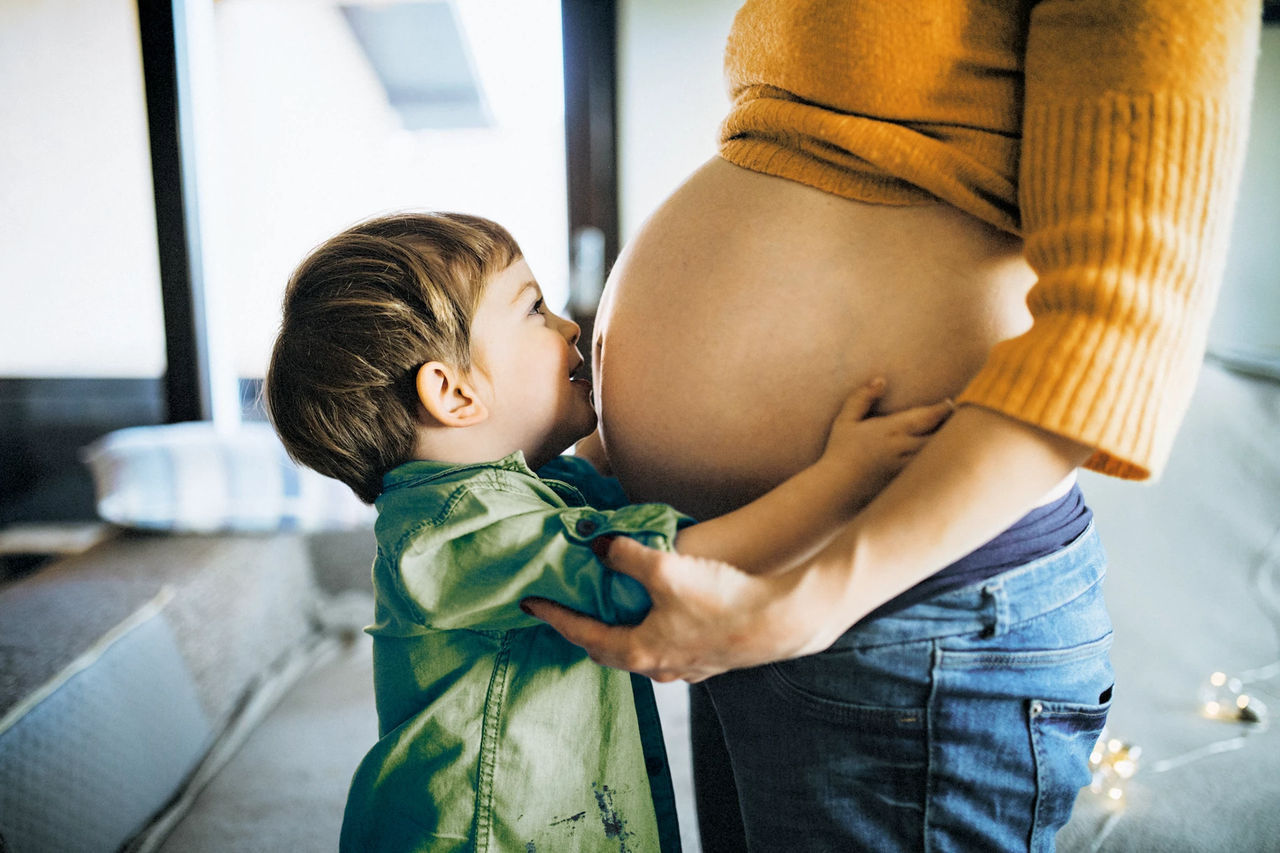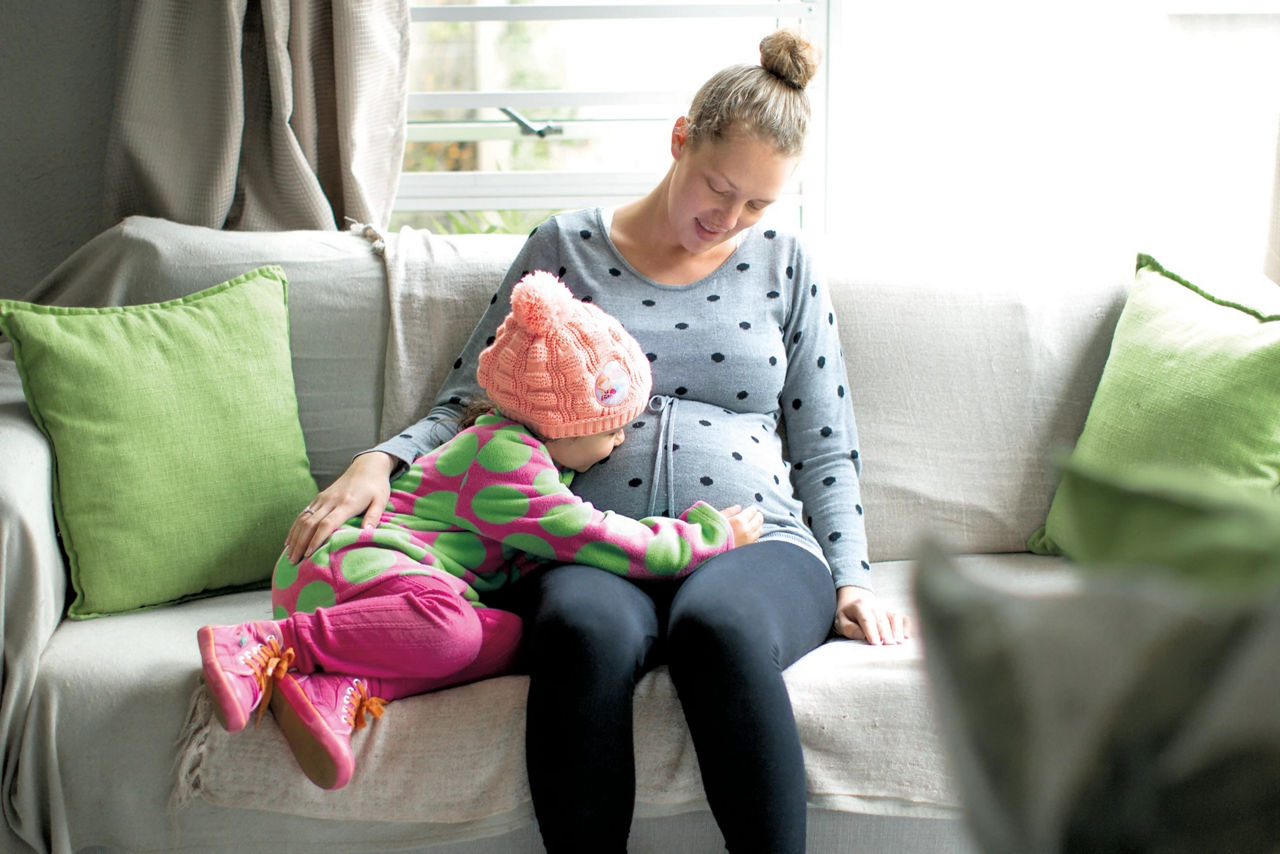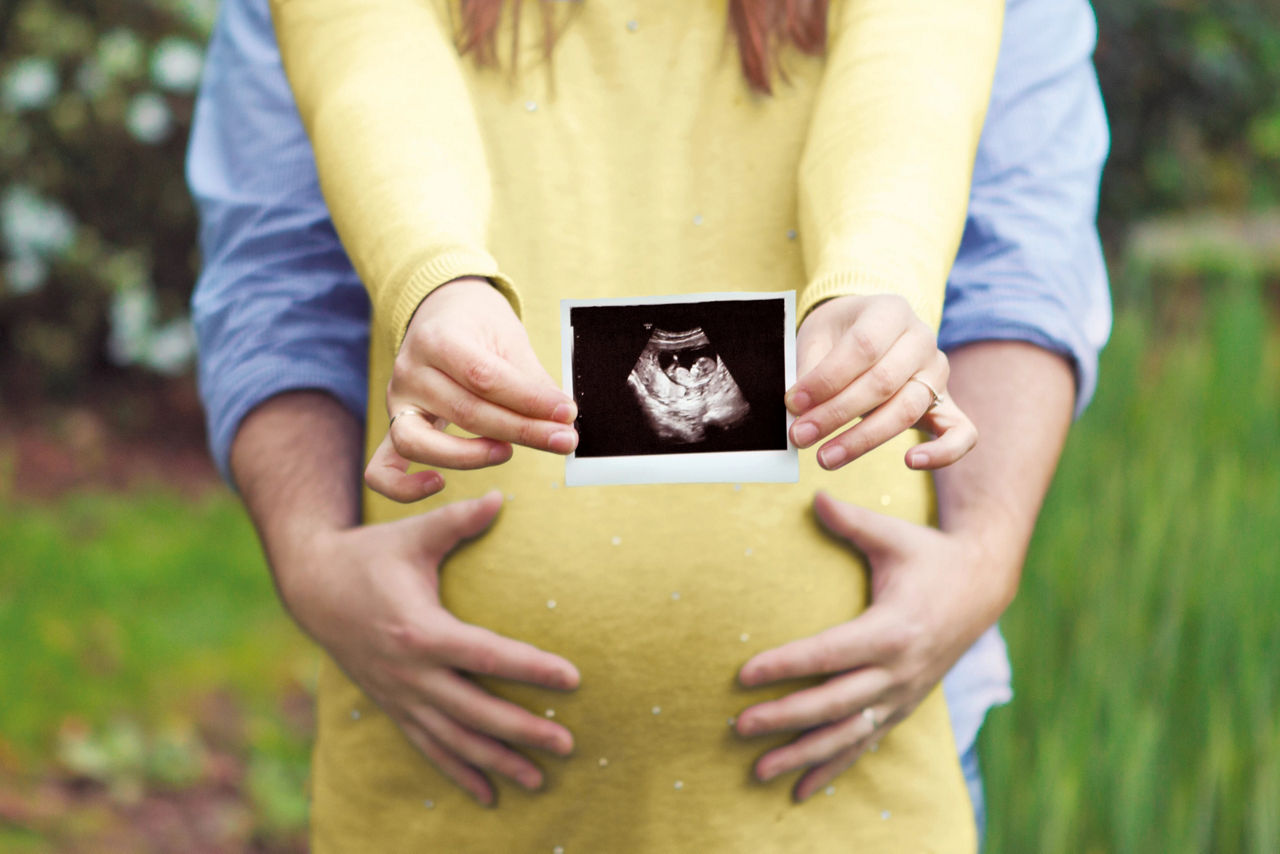Free weaning plan - Register here
When your baby starts to kick…
When will I feel my baby move? It’s a question that many expectant mums ask themselves as their pregnancy progresses.
One of the best things about being pregnant is when you first get to feel your baby kicking. This is known as ‘foetal movement’, or quickening and is one of the early physical signs that there’s a tiny person living inside you! Your baby’s first movements will likely be a happy and emotional milestone for you, but it’s okay to feel a little nervous too.
When most people think of their baby kicking, they imagine little feet prodding pregnant tummies, or seeing the bump move. But each and every mum has a different experience of their little one’s first movements. Just remember, your baby’s first kicks and wriggles are their way of showing you that they’re beginning to grow and develop.
When does a baby start kicking?
Most mums-to-be will start to feel their baby’s first movements and wriggles between 16 and 24 weeks of pregnancy1. If you’re pregnant with your first baby, it’s normal to not feel any movements until after 20 weeks of pregnancy. If you pass the 24-week mark and haven’t felt any movements yet, talk to your midwife. They’ll l be able to check your baby’s heartbeat and movements to make sure you and your baby are healthy1.
There are some things that can affect when you’ll feel your baby move and how strongly. For example, your placenta - the organ that feeds oxygen and nutrients to your baby via your blood - is placed at the front of your womb, this may make your baby’s movements less obvious2. If there are any concerns about the placement of your placenta, your midwife and obstetrician will keep a close eye on this throughout your pregnancy.
Once your baby starts moving, there’s no stopping them, and you should be able to feel them moving right up until (and during) labour1. Throughout your pregnancy, you’ll get to know when and how your baby usually moves. The NHS advises that it’s not necessary to take ‘kick counts’, and instead pay attention to what’s normal for you and your baby. Get in touch with your doctor or midwife straight away if anything changes1.

What do baby kicks feel like?
Your baby’s first movements are likely to feel like flutters, swishes and rolls2. If this is your first baby, you might not realise that those feelings are your baby’s movements straight away. As your baby grows, however, their movements will start to feel more like obvious kicks and jerks1.
20 – 24 weeks: Your baby’s earliest movements can feel like swishing or even bubbles, and it can be difficult to tell the difference between gas bubbles and your baby moving!3
24 – 28 weeks: During 24 - 28 weeks of pregnancy, your baby is now moving a lot more, and is likely to respond to touch and sound4. They might even ‘jump’ when they hear loud noises.
Around this time, it’s normal for you to feel short, repetitive movements as your baby starts to hiccup4. There’s no need to worry, this is normal as your little one practises their breathing movements5. This can go on for a little while, so be prepared for the odd evening spent feeling your little one hiccup the night away. But don’t count hiccups or these repetitive movements in your normal pattern as these are involuntary movements.
29 – 32 weeks: Your baby will move around more and more until around 32 weeks of pregnancy. After this, your baby’s movements should stay about the same all the way up until your due date and labour2. You might notice that your little one is particularly active in the afternoons and evenings. They’ll usually have periods of stillness for around 20-40 minutes at a time while they sleep, and then start to wriggle around again as they wake up2.
By now, you’ll probably be used to the pattern of your baby’s movements, and know when to expect lots of activity or when things will be calmer6. Keep track of these ebbs and flows and get in touch with your midwife if anything changes.
36 – 40 weeks: You might have heard the myth that babies move less towards the end of pregnancy and your due date, but this isn’t the case. You should be able to feel your little one’s movements right up until you give birth, including during labour1.
Should you count your baby’s kicks?
There isn’t a ‘normal’ amount of movement or kick count to expect, but your little one will settle into their own routine. Instead of using kick counts, you should pay attention to what’s normal for your baby, so you get to know what time of day they are most active, and how much movement is to expect. Knowing this pattern means that you’re more likely to notice if something changes, like if your baby starts to move less or more than usual. That means you can get the advice you need as early as possible2.
You might have seen tools like movement charts that you can use to record your baby’s kick counts. You can use one if you like, but there isn’t much evidence that they actually help. You know your baby best, so as long as you’re aware of their patterns you shouldn’t need anything extra to help you keep track2.
Can you encourage your baby to kick?
If you haven’t felt any movements after 24 weeks, or your baby is moving less than normal, you should not try to make them move6. Contact your maternity unit, who will be able to monitor your baby for you.
What to do if your baby’s movements slow down
Your baby’s wriggles and kicks are important signs that they are healthy and developing as they should be. If their movements become fewer and further between, it’s important to go for a check-up in case your baby is unwell. Usually these checks show that everything is okay, but it’s always best to know for sure2.
Under 24 weeks of pregnancy
If you haven’t felt your baby’s first movements by 24 weeks of pregnancy, contact your midwife or maternity unit. They will check your baby’s heartbeat and may do an ultrasound scan to see your baby in your womb1.
Between 24 to 26 weeks pregnant
If your baby’s movements slow down or stop at this stage in your pregnancy, contact your local maternity unit straight away (don’t wait until the next day or your next appointment). They will do a full check including monitoring your baby’s heartbeat and measuring your blood pressure2.
Over 26 weeks pregnant
If your baby’s movements slow down or stop after 26 weeks, contact your local maternity unit straight away (don’t wait until the next day or your next appointment). They will do a full check including measuring your bump and monitoring your baby’s heartbeat. You shouldn’t be discharged until you are happy that your baby’s movements are normal again2.
When should you go to hospital for reduced fetal movement?
A baby’s movements are a clear sign of their healthy growth and development. So if you are in any way worried that your baby isn’t moving as much as they usually do, you should get in touch with your local maternity unit2.
It’s important to note that the NHS does not recommend using a home doppler kit to listen to your baby’s heartbeat, because they’re not always reliable. Even if you do hear your baby’s heartbeat using a kit like this, that doesn’t necessarily mean that they are healthy1. You should still be seen by a doctor or midwife if you are feeling fewer movements than normal.
Still worried about your baby’s movements?
What if you feel kicks and you don’t think you’re pregnant?
Phantom baby kicks can happen more often than you think. Almost 40% of women feel phantom kicks, even up to 28 years after their first pregnancy7. If you’re worried about any ‘fluttering’ or ‘kicking’ feelings in your stomach, contact your GP.
Have a question about your scans during pregnancy?
Remember, if you'd like to know more about your pregnancy, why not give one of our friendly experts a call on 0800 977 8880. Or ask us a question online, instantly, using Live Chat Monday to Friday, 8am – 8pm.
Last reviewed: October 2024
Reviewed by Nutricia’s Medical and Scientific Affairs Team
NHS (2021) Your baby's movements [online]. Available at https://www.nhs.uk/pregnancy/keeping-well/your-babys-movements/ [Accessed May 2024]
Royal College of Obstetricians and Gynaecologists (2019). Your baby's movements in pregnancy [online]. Available at https://www.rcog.org.uk/for-the-public/browse-our-patient-information/your-babys-movements-in-pregnancy/ [Accessed May 2024]
NHS East Kent Hospitals University. Foetal movements [online]. Available at https://www.ekhuft.nhs.uk/services/during-your-pregnancy/foetal-movements/ [Accessed May 2024]
NHS (2021). You and your baby at 25 weeks pregnant [online] Available at https://www.nhs.uk/pregnancy/week-by-week/13-to-27/25-weeks/ [Accessed May 2024]
Tommy's (2022). 25 weeks pregnant: baby's development, stomach pain and planning the birth [online] Available at https://www.tommys.org/pregnancy-information/im-pregnant/pregnancy-week-by-week/25-weeks-pregnant [Accessed May 2024]
Tommy's (2023). Baby movements in pregnancy [online] Available at https://www.tommys.org/pregnancy-information/pregnancy-symptom-checker/baby-fetal-movements [Accessed May 2024]
Sasan D, Ward PGD, Nash M, Orchard ER, Farrell MJ, Hohwy J, Jamadar SD. "Phantom Kicks": Women's Subjective Experience of Fetal Kicks After the Postpartum Period. J Womens Health (Larchmt). 2021 Jan;30(1):36-44. doi: 10.1089/jwh.2019.8191. Epub 2020 Aug 25. PMID: 32846107.

Join our baby club
Ready to stop worrying about what other people think and do what feels right to you? We’ll give you the support you need to follow your instincts and enjoy parenthood to the max:
Helpful emails
Non-judgemental support
Free weaning plan
Tips from real parents
More from pregnancy
Pregnancy topics
Need free advice with a smile? Get in touch with our dedicated Care team.
Ask us a question (8am - 8pm Monday to Friday, 10am - 4pm Weekends)
Messenger
Contact us on Facebook (10am - 10pm, 7 days a week)
Call us
Call us on 0800 977 8880 (8am - 8pm Monday to Friday)
FAQs
Get answers to your most frequently asked questions





